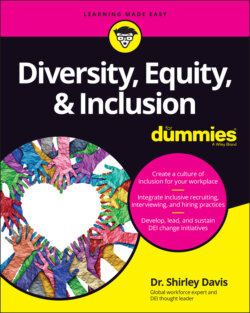Читать книгу Diversity, Equity & Inclusion For Dummies - Dr. Shirley Davis - Страница 49
Examining automation’s and artificial intelligence’s impact on talent and DEI
ОглавлениеAutomation and artificial intelligence (AI) are replacing human tasks. This move changes the skills people need to succeed in the workplace. PwC’s Future of Work report indicates the following:
37 percent of workers are concerned that automation puts their jobs at risk
74 percent of workers are ready to learn new skills or retrain
60 percent of workers think long-term employment won’t be an option for the future
73 percent of workers think technology can’t replace the human brain
The automation and AI impact on DEI may make its greatest influence on the first step to working: the screening and selection process. Here are some areas where automation and AI can assist with DEI:
Using data tools’ algorithms to screen employee information to help managers create diverse interview panels that reduce implicit bias
Using AI and data science to match high-potential applicants with job roles regardless of demographic information (such as race, gender, sexual orientation, name, ability, and age)
Writing unbiased job postings with gender-neutral language
Offering fairer salaries by analyzing market data to recommend more equitable pay ranges
AI has the ability to help humans make bias-free decisions only if the systems are built without unconscious bias. A key aspect of AI is that its systems are built on data and learn from data that a human with their own perspective programs in. If programmers build their own implicit biases into the systems, the systems become flawed. For example, many countries already have AI technology that tracks people’s movement and has facial recognition. But research indicates that facial recognition technology has the most errors with correctly recognizing Black and brown faces. When authorities use these systems, these errors can have negative effects on citizens.
DEI practices within AI are crucial. A study by AI Now found that only 15 percent of AI researchers at Facebook and 10 percent at Google were women. It also revealed that less than 5 percent of the staff at Facebook, Google, and Microsoft were Black, when the Black workforce in the U.S. is approximately 12 percent of the overall labor force. This lack of diverse engineers and researchers may result in the continuation of AI bias on a large scale. For example, in 2015 only 18 percent of computer science majors in U.S. universities were women, down from 37 percent in 1984. This decrease indicates a pipeline problem with education, hiring, and promotion within the field. Companies must ensure they build diversity, equity, and inclusion — not bias — into the root of AI systems.
